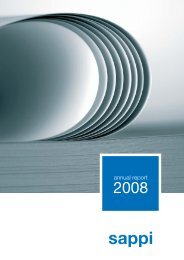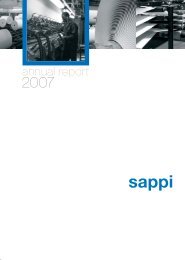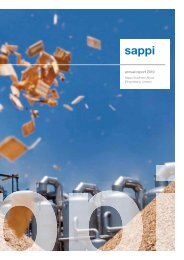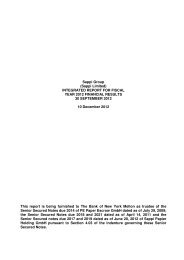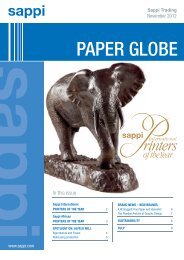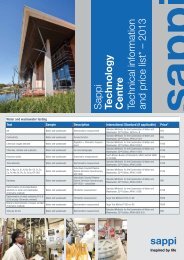SAPPI LTD (SAP) 6-K
SAPPI LTD (SAP) 6-K
SAPPI LTD (SAP) 6-K
You also want an ePaper? Increase the reach of your titles
YUMPU automatically turns print PDFs into web optimized ePapers that Google loves.
M-real uses a centralised approach via a cash pooling arrangement to manage cash and to finance its operations. Each of the Company’s entities historically<br />
maintained a separate balance sheet which included financing positions with M-real Group. Interest earned on deposits through the cash pooling arrangement<br />
and payable on related party interest bearing borrowings was historically settled through the cash pool arrangement. Invested equity of the Company<br />
represents M-real’s residual claim on the Company entities and includes allocations from M-real, settlement of intercompany transactions with M-real, and<br />
the Company’s cumulative operating results, including other income items recognised directly in equity.<br />
These combined financial statements of the Company have been prepared in accordance with International Financial Reporting Standards (IFRS), as adopted<br />
by the International Accounting Standards Board (IASB). The combined financial statements are presented in thousands of Euros (EUR), unless otherwise<br />
stated. The combined financial statements have been prepared on a historical cost basis, except for certain other financial assets and liabilities, which are<br />
measured at fair value.<br />
Note 2•Significant accounting policies<br />
The financial statements have been prepared in accordance to IFRS. A summary of the significant accounting policies used in the preparation of the<br />
accompanying combined financial statements is presented below.<br />
Principles of combination<br />
The combined financial statements include the accounts of the Company’s managed operations that are wholly owned by M-real and have been combined as<br />
if together for all periods presented. Intercompany balances and transactions with combined entities have been eliminated. Intercompany balances and<br />
transactions with M-real and its other subsidiaries have been recorded as related party transactions and are further discussed in the related parties and other<br />
notes contained in these financial statements.<br />
Critical accounting estimates and assumptions<br />
The Company makes estimates and assumptions concerning the future. The resulting accounting estimates will, by definition, seldom equal the related actual<br />
results. The estimates and assumptions that have a significant risk of causing a material adjustment to the carrying amounts of assets and liabilities within the<br />
next financial year are discussed below.<br />
(a) Estimated impairment and goodwill and fixed assets, including certain subsequent reversals<br />
The Company annually tests whether goodwill has suffered any impairment in accordance with its accounting policy and on an interim basis if potential<br />
impairment indicators have occurred. The recoverable amount of its cash-generating unit has been determined based on value-in-use<br />
calculations. These calculations require the use of estimates.<br />
(b) Estimated corporate overhead allocations<br />
As disclosed in Note 1, management has estimated the allocation of various corporate overhead expenses and goodwill that have historically been paid<br />
and maintained by M-real. These allocations require the use of estimates and management judgment.<br />
Foreign currency<br />
The combined financial statements are presented in Euros, which is the Company’s functional and presentation currency. The currency translation of financial<br />
statements of the combined operations outside the Euro zone prepared in a foreign currency into the presentation currency is as follows: assets and liabilities<br />
are translated at the closing rate, and income and expenses are translated to Euros, as the reporting currency, using average rates. Exchange differences are<br />
recognised directly in equity. If foreign operations are sold, recorded differences from currency translation are reversed and recognised in income. When<br />
making the transition to IFRS, translation differences that arose prior to 1 January 2004 were recorded in invested equity and will not be subsequently recasted<br />
into the income statement. Biberist in Switzerland is the Company’s only business that has a functional currency other than the euro.<br />
66



